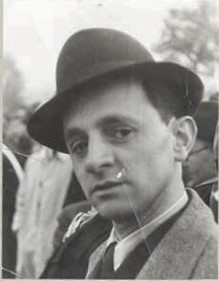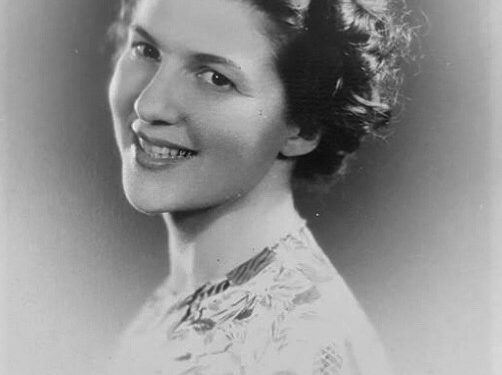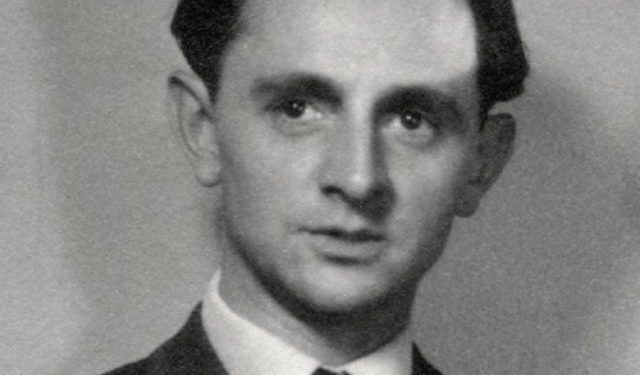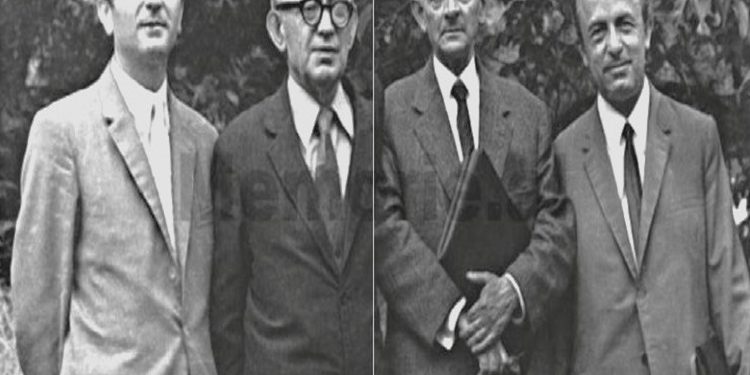By Dr. Ledia Dushku
The second part
Memorie.al / The relations of totalitarian regimes with intellectuals have often become the subject of discussions in scholarly circles. It seems like when this relationship is delineated in two opposite directions, where the intellectual must choose between being a “man of the yard” or a “dissident”, without having a middle ground. But in communist dictatorships there is the concept of the “art of survival,” which is nothing more than a combination of calculated submission, self-controlled criticism, tactical keeping of a low profile, and the quietly intelligent use of opportunities that may arise. In this way, accepting the social contract of the communist regime does not always make the intellectual a “man of the court”.
Continues from the previous issue
From the above, the relationship between the communist state and the researcher Eqrem Çabej was conditioned by several aspects: The first aspect had to do with the past life, with an emphasis on education in the West, family background, social circle and especially the years of the War the Second World War.
For this, the relationship between the state and Eqerem Çabej passed through the sieve of the State Security. The first information, which arrives in the form of a note, in the State Security Directorate regarding Çabej, belongs to the Power Sector, on September 29, 1946, according to which: “Eqerem Çabej was sent to Italy at the time of fascism from the Ministry of Economy to follow some studies.
After the capitulation of Italy, he had good relations with the Germans, because they appointed him minister, but he did not accept, because he was advised by his fellow exiles. This was taken care of and is the main element that led Stefo Grabocka and his friends to come to Albania. It leaves us doubting that he was loyal to the Germans, to the point of freeing and sending to Albania 30-40 Albanians, interned by the Italians and so many Yugoslavs. Doubts about his attitude.
The note was probably compiled by Mehmet Shehu, at that time the Chief of the General Staff of the National Army, and then the Minister of the Interior, from where the Directorate of State Security depended. In Çabej’s form file, the data on his involvement in the repatriation process of dozens of Albanians are found in the undated material, which bears the title; “Part of the unsigned report of General Mehmet Shehu”.
Eqrem Çabej’s close ties with German culture, which came due to his education in Vienna, would not be surprising. The archival documentation consulted so far testifies to Çabe’s sporadic contacts with the German authorities in Rome. Consul Gumpert’s telegram, found in the Archives of the Armed Forces of Albania, evidences a plea / plea, by Eqrem Çabej, for the repatriation of Albanians interned by the Italian invaders, in various camps in Northern and Central Italy.
Regarding the case in question, in the book ‘Interview with me’ (‘Clouds and stones’) Petro Marko says that Stefo Grabocka and Mina Uçi had advised him to meet Eqrem Çabej. The latter had to “try and get him a letter from the German embassy in Rome to go and collect the imprisoned and interned Albanians”. Çabej had managed to secure the required letter and Petro Marko was authorized “by the German embassy in Rome to travel through Italy, to collect the Albanian prisoners and internees, to bring them to Rome, from where they will be repatriated. The military authorities of the Reich are requested not to prevent him from carrying out his mission”.
Brikena Çabej, again referring to a conversation she had with Petro Marko, testifies that her father had contacted and intervened through a classmate from his schooling period in Vienna, who had been mobilized by the Germans and held a high position in the occupation structures German in Rome. The meeting between the two fellow students happened by chance in a cafe in Rome.
“In that meeting, that early friend had shown him that he had enough things in hand and had shown his willingness to help him in case of need. The help that Çabej asked his old friend in the winter of 1943 was precisely the repatriation of 23 of his fellow patriots.
Furthermore, Petro Marko went together with Çabejn, to submit this request [to the relevant authorities]”. Despite the fact that Eqrem Çabej’s intervention was successful, this does not justify any close political connection between him and the Germans. So far, neither the German documentation nor the consulted literature gives any indication of such a thing.
In the following, the information of the State Security about the past of Eqrem Çabej, is supplemented and expanded. In the material prepared by the Tirana section, on January 9, 1948, in addition to the facts related to the studies carried out in Austria, the knowledge of several foreign languages, descent from “wealthy strata”, life in “bourgeois circles”, the composition of the social circle from “opposing elements of power”, such as Selahudin Toto, Gjergj Ashta, Vedat Kokona, Sabiha Kasimati, part of the researchers of the Institute of Studies, emphasis is placed on Çabej’s past, in the years of the Second World War.
This aspect was separated from the context, interpreted and manipulated in the spirit of the time, which made the information as a whole incomplete, far from the truth. According to the report: “He welcomed the fascist occupation, spreading it and declaring himself a friend of our people, he worked with flesh and soul for fascism and supported his people. For this he was sent to Italy for studies, where he stayed until the capitulation of Italy. After the capitulation, Eqremi was appointed Minister of Education, even though he had not yet returned from Italy. During the Nazi occupation, he returned to Albania and began to cooperate with them, defending their policy”.
Despite the above, in the information that came to the State Security, the phrase “enemy of popular power” was not attached to the name of Eqrem Çabej. For the first time, this phrase is used in the report dated October 11, 1950, of the State Security employee with the nickname “Pruresja”, but specifying that there was “no extended anti-government activity”. The label “enemy of popular power” was a consequence of his past, with a focus on the years of the Second World War.
The information was already enriched with two new pieces of information: “Çabej, his sister’s husband, an exponent of Balli, is on the run” and “one of the partisans, when the country was not yet liberated, his brother was killed, he was a prefect in Kosovo”. A special place was dedicated to Eqrem Çabej’s relationship with Sabiha Kasimati, due to the fact that “Pruresja” was the person charged by the State Security to supervise the latter.
The relationship between them was considered as “close friendship”, “more of a political-cultural character”, between which “they talk about culture, science and works… of writers with bourgeois culture. Marxist culture is considered nothing for them, Lenin’s works, not as masterpieces, but as random events”!
The relationship of the State Security, with the researcher Çabej, took on other dimensions in 1952, when the regime had to be convinced of the level of danger, having his activity fully under surveillance. In October of that year, the surveillance level of the “adversary element Eqrem Çabej”, from level II/B, would be categorized to the highest level, II/A. Both categorization reports concluded that; Çabej carried out “anti-popular activity, against the homeland and the people”.
The categorization report at level II/A presents more complete information, aiming to justify the change to a higher categorization. Emphasis was placed on education in Vienna, from where Nazi tendencies flowed, which were considered equivalent to those of the anti-powers. These tendencies were reinforced in the years of the Second World War, when he stayed in Italy, as a “representative of Ernest Koliq”, when he was offered the position of Minister of Education.
In accordance with the spirit and orientation of the communist leadership, the attitude of the mentioned during the Second World War was also decisive for his attitude in the future. According to the report, Çabej, because of his past, was “predisposed to be the enemy of the class, which even today continues to act, because since after the liberation and today, he is constantly seen associating with suspicious elements, such as his…”.
In addition to the name of the biologist Sabiha Kasimati, already executed in connection with the bomb in the Soviet Legation, for whom it was speculated that Çabej was the one who had done hostile work, the social circle was completed with Shyrete Turkesh, expelled from the Party, monitored at level II/A , who would later be his wife; the ethnologist Rrok Zojzi, who was considered a “fascist with a stamp”, was monitored in II/B; the former Minister of Education, his colleague at the Institute of Sciences, Sejfulla Malëshova, “party traitor”, surveilled in II/A.
But, to move him from category II/B/ too II/A/, neither “all this activity” was enough, nor the fact that Çabej “is a very intelligent element with a wide culture and a first-hand exponent of the reaction”. It was necessary “a note put by the head of this department, lieutenant general Mehmet Shehu, to be put into active processing”, this note was evidenced by lieutenant Taip Rada, as important to pass the case of Çabej, from the category II/B, to II/A.
The placement in category II/A was accompanied by the drafting of detailed plans of “agency operative measures”. From October 1952 to June 1955, seven action plans and a special plan were drawn up in July 1954. The first plan emphasized the use of the existing State Security agency and collaborators, “but if such were not found, then we will study finding a candidate for recruitment and recruit him”. Immediately, a whole network of collaborators was activated, where in the first years, the nicknames “Pruresja”, “Drojtja”, “Edija”, “Dhelpërija”, “Çajupja”, “Taraboshi” stand out.
Their job was to inform in detail, on every aspect of Eqrem Çabej’s activity, the character he had, his scientific activity, the circle of people he associated with, his interest or not in politics, the conversations he held, not only at the Institute of Sciences or the National Library, but also home or wherever he went, in Tirana or abroad. Meanwhile, work began to find information from the minutes of the other accused, from where information implicating the researcher Çabej had to be extracted. The purpose was to justify the “hostile agent activity” of Eqrem Çabej.
Because the expected information was not provided, on April 10, 1953, the second plan of measures was prepared, which added the surveillance of correspondence, inside and outside Albania, as well as the control of entrances and exits to the house where he lived. But, despite the successive plans, the desire and the will of the State Security, to discover the “hostile and agent activity” of Eqrem Çabej, the objectives remained unrealized. As a result, in October 1958, the surveillance level was lowered from category II/A too II/B. The intensity of surveillance decreased and in 1963, the form file will be archived, but not forever.
The second aspect that conditioned the relationship of the communist state with the researcher Çabej, was the psychological profile and human character. The nature and character of Eqrem Çabej was placed in the focus of the work of State Security associates, in order to understand the degree of his dangerousness. In general, the relationships, where those of the collaborator with the nickname “Edija” stand out, a student of Çabej and since 1952, a colleague with him, describe the professor as a man with “bourgeois culture”, quite smart and intelligent, but cunning.
Even in Zog’s time, “when the usual place for most professors was the cafe, this one studied, he is not a gambling man”. He showed a big ego, he valued himself a lot, he was quick to touch in the Seder, but he always showed prudence and seriousness. As for what was considered the “social-political side” in the terminology of the time, it was evident that the conviction of “a determined bourgeois nationalist” was consistently maintained.
In accordance with the expectation of the time, Çabe’s relationship with politics was placed in the focus of the relations of collaborators. In general, the non-political past and the indifferent/disregarding present, against politics, were clearly evident there. The colleague with the nickname “Edija” thought it appropriate to share Çabej’s opinion, that: “There are some great people who stay above politics, they are not interested, and they don’t care about politics at all”. “He said this with passion,” emphasized “Edija, – as much as he let me understand that he was also convinced that such an attitude was suitable for great people, that’s why he kept…”! Furthermore, Çabej was considered arrogant, who did not agree with the class struggle and saw scientific issues as separate from politics, thus challenging the ideology of the time.
From the above, the description of Eqrem Çabej’s character generally did not justify the profile of the “enemy of popular power”, with high risk. Although the relations of collaborators, evidence his extremely reserved nature, I tend to think that this was not entirely an innate aspect of Chabey’s character, but created under the influence of the circumstances of the time, as a protective measure against the harshness of the regime and the feeling of being surrounded by ubiquitous spies.
By consulting the form file, it is clearly noticeable that the circle of people with whom Eqerem Çabej contacted, decreases significantly, especially since 1952, when he was placed under surveillance. Thus, if in 1948, Çabej had contacted 62 people, in 1953, the number had gone to 17, while in 1956, during the 5 days of surveillance, he had met only 2 people outside of his immediate family, one of them to whom he was the father-in-law.
How does the profile stand dressed in the ideology of the time, in front of the profile of the daughter for the father? Brikena Çabej describes her father like this: “A discreet and restrained man, with an incredible education in communicating with everyone, from a small child to the most respectable old man. I have rarely seen him lose his temper and lose his temper. Usually, when this happened, he ran out of the room. He did not insult anyone and avoided conflicts as much as possible. I believe he did what the people say: ‘The meat should be cooked and the skewer should not burn.’
He had a proverbial honesty and a character truly to be envied. He helped others a lot, he didn’t do anything with a fuss. He had principles, which he never violated. He knew very well where the rotten board was and stayed away from it. He tried to impress upon the people around him, thoughts and ideas, without giving advice, but giving his example; it was an expression that was often mentioned in our house, he mentioned it very often: ‘Words teach you, examples attract you.’
He never complained, although he has not led an easy life. The pressure of the regime made him modest. He didn’t talk about the things that hurt him. If there was an essence in his character and being, it was patriotism and patriotism. As for politics, he followed it with interest, but he himself completely avoided dealing with it”!
The third aspect that improved the relationship of the communist state with the researcher Çabej, was the relationship that the Party and Enver Hoxha created with the Institute of Sciences in general and himself in particular. This relationship was conditioned by the attention that received on the one hand the preparation of “new cadres” and the role that experienced researchers would play and on the other hand, the process of reforming the “old cadres”. Memorie.al
The next issue follows















